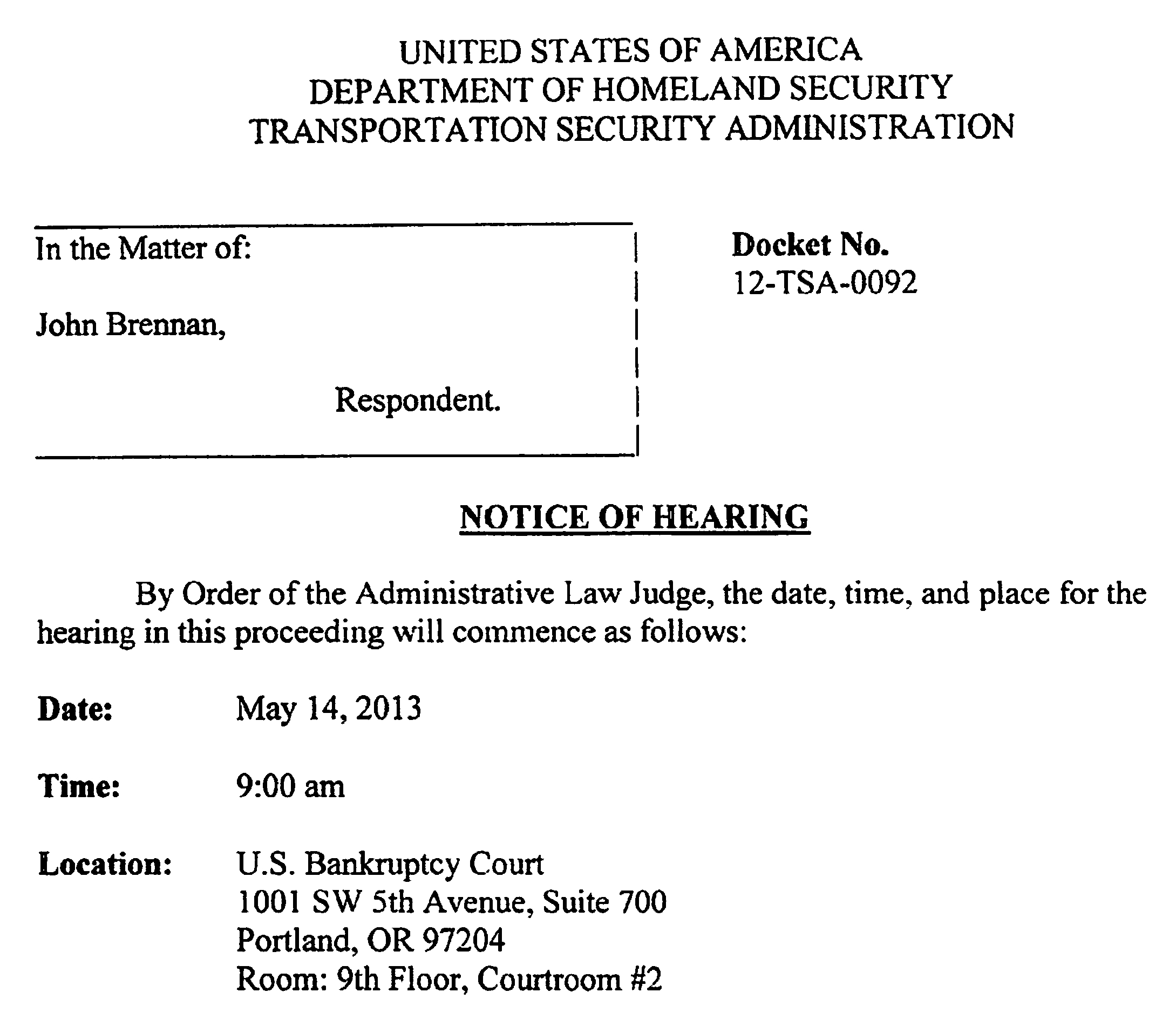After extensive negotiations, we were given permission to record audio (but not video or still photographs) of the formal hearing conducted in Portland. OR, on May 14, 2013, in the matter of “Naked American Hero” John Brennan.
Linked below are audio recordings of the entirety of the hearing:
Dramatis Personae other than witnesses (in order of appearance):
Audio (MP3 recordings can be streamed from here or downloaded directly from the links below):
- Introduction and opening statements (4 min. 47 sec., 4 MB mp3)
- Steven Van Gordon (TSA checkpoint staff, PDX) (1 hr. 11 min. 38 sec., 66 MB mp3)
- Jerry Nichols (TSA checkpoint supervisor, PDX) (18 min. 56 sec., 17 MB mp3)
- Jonathan David (TSA manager, PDX) (42 min. 17 sec., 39 MB mp3)
- Officer Brian Cotter (Port of Portland Police Department) (15 min. 38 sec., 14 MB mp3)
- Marsha Shanahan (TSA Transportation Security Inspector) (36 min. 58 sec., 37 MB mp3)
- John Brennan (“Respondent”) (27 min. 16 sec., 25 MB mp3)
- Closing statements (4 min. 34 sec. 4 MB mp3)
Video: Excerpt from TSA/airport security camera video (from news report, but also entered into evidence at the formal hearing)
Mr. Brennan exercised his First Amendment right to express his political opinion by taking off all his clothes while he was being subjected to “secondary” searching at a TSA checkpoint at the Portland airport (PDX) on April 17, 2012.
The TSA called the Portland police, who arrested Mr. Brennan for “indecent” exposure, but he was eventually acquitted of all criminal charges by an Oregon judge.
Undeterred — or, more precisely, fearing that Mr. Brennan and others would no longer be deterred from similar politically expressive conduct after his acquittal — the TSA has proposed to assess a $1,000 “civil penalty” against Mr. Brennan for “interfering with screening”.
It certainly appears to us that Mr. Brennan’s actions should have facilitated his screening, and he testified that he was trying to assist the screeners in determining that he was not carrying explosives or weapons.
There are many Alice-In-Wonderland aspects to this administrative proceeding, among them that the TSA has declared the “Notice of Proposed Civil Penalty” which explains the basis for the proposed fine to be “Sensitive Security Information” (SSI) exempt from public disclosure. The notice was, we presume, served on Mr. Brennan and/or his attorney, but they were not allowed to quote from it publicly.
Portions of the evidence and allegations against Mr. Brennan were also designated as SSI and exempt from disclosure. We were allowed to attend and listen to the whole formal hearing, but not to see any of the documents that were being discussed and entered into the (secret) record.
The decision of the Administrative Law Judge (ALJ) on whether to assess a fine against Mr. Brennan, and if so in what amount, will probably also deemed SSI.
According to the rules for TSA civil penalty proceedings, journalists or members of the public can inspect the docket — including the evidence, transcripts of the depositions and the formal hearing, and pre- and post-hearing briefs — only by filing a formal request under the Freedom Of Information Act (FOIA).
We’ve filed a FOIA request for the complete docket record, and have asked (in accordance with FOIA) that it be processed on an expedited basis, but the TSA’s first response was that they estimated that they won’t complete their response until August 23, 2013. The Coast Guard ALJ’s office told us that they couldn’t remember anyone ever before asking for an active civil penalty docket, and hasn’t yet given us any estimated date for their response.
In the meantime, our audio recordings linked above are the best available public indication of what the TSA thinks Mr. Brennan did, how they think he “interfered with screening“, and why they think he deserves a $1,000 fine. These are also the best available guidance, for others who may be subjected to TSA enforcement action, about how the process works.
The TSA has threatened other protesters with civil penalties, but in most cases either people pay the proposed fines (for example, if they were trying to carry otherwise-legal firearms through a TSA checkpoint, which happens every day), they are convicted of some criminal offense (usually for drugs), or the TSA backs down and withdraws its proposal for a fine. So far as we know, this is the first time the TSA has continued to pursue a proposed civil penalty for nonviolent, non-criminal political protest at a TSA checkpoint by someone who contested the proposed fine and exercised their right to a formal hearing.
(TSA Publc Affairs Manager Lorie Dankers, who came down from the TSA regional office in Seattle along with the TSA’s lawyer to attend the hearing in Portland, told reporters that since the TSA’s creation the agency has assessed “a few hundred” civil penalties for “interfering with screening.” But most of those cases involved neither political protest nor a formal hearing.)
This was an administrative proceeding, not a trial. It was held in a courtroom rented from the U.S. Bankruptcy Court, but it was not a trial, not a “court” proceeding, and not governed by court rules.
Read More →
